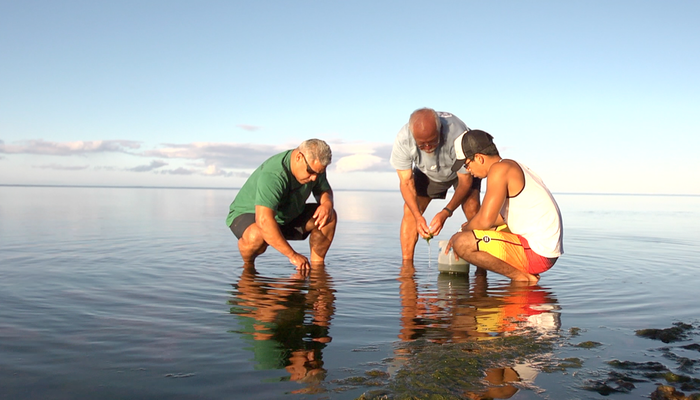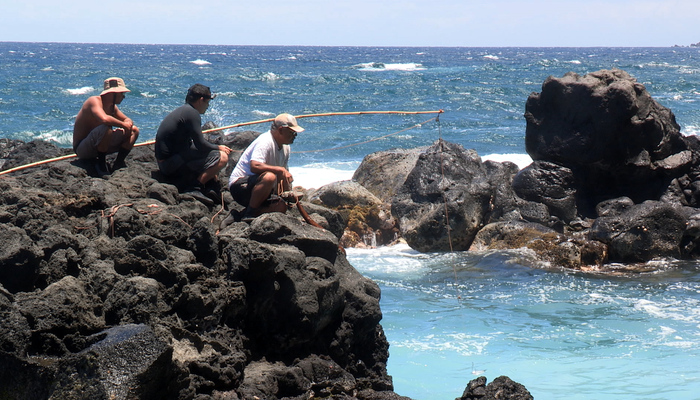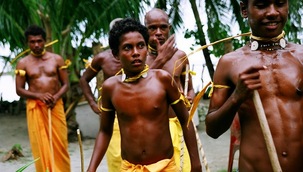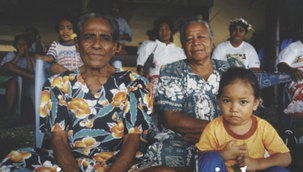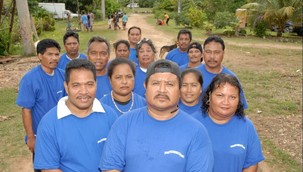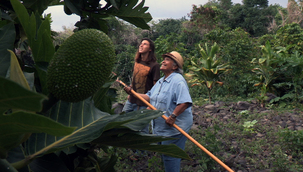
Nā Loea: The Masters II
Enjoy the second installment of stories that beautifully depict the lives of those who are considered masters in Hawaiian culture.
- Filmmaker(s)
- Bryson Hoe
- Kenneth Chong
- Keoni Lee
- Justyn Ah Chong
- Matt Yamashita
- Category
- Full-Length Film
- Currently On-Air
- Subject Matter
- Health, Environment & Sustainability, Families
- Featured In
- 2015 Deep Waters Pacific Film Series

- 25 in 25
- Region
- Polynesia
- Length
- 60 Minutes
- Year
- 2014
- Website
- www.oiwi.tv/naloea
Fans of Nā Loea: The Masters (featured in Pacific Heartbeat Season 3) will enjoy this second installment of stories that beautifully depict the lives of those who are considered masters in Hawaiian culture. Mac Poepoe is a Native Hawaiian fisherman and a community leader on Moloka`i who has dedicated his life ensuring that the ocean, or “icebox,” will be well-stocked for generations to come. Herbert Hoe recognized how the widespread health afflictions of the Native Hawaiian people impaired their ability to care for themselves, and created his `Ai Pono diet program utilizing the traditional foods of ancient Hawaiians.
Mac Poepoe: Mālama Moʻomomi
Mālama (maah-la-mah)
1. nvt. To take care of, tend, attend, care for, preserve, protect, beware, save, maintain
Moʻomomi (mo-o-mo-me)
A coastal area on the northern side of Molokaʻi. The backyard to the Hawaiian homestead community of Hoʻolehua.
For locals on the rural Hawaiian island of Moloka‘i, the “ice box” isn’t just the refrigerator in their kitchens but the abundant ocean that still provides a main source of sustenance for that community; a community that has fought against development and many modern “conveniences” with great resolve to maintain their unique island lifestyle. Mālama Moʻomomi features “Mac” Poepoe, a native Hawaiian fisherman and community leader on Molokaʻi, who has dedicated his life to sharing his knowledge of traditional resource management with the hope of ensuring that this ocean “ice box” will be well-stocked for generations to come. Mac’s wealth of knowledge and expertise accumulated over his years of growing up in the rigor and lifestyle of a Hawaiian family that has been fishing and maintaining the sustainability of these waters for generations. Mac is one of a small group of skilled fisherman who approach their practice with a passion not just for the sport of it but to hone and perpetuate their skill and expertise in managing Hawaiʻi’s ocean ecosystems, which is critical to the sustainability of Hawai‘i and its people. This humble fisherman is a giant resource for Hawaiʻi’s future.
Herbert Hoe: Food for the Soul
Growing up in the ahupuaʻa (historic subdivision of land) of Hakipuʻu, Oʻahu, Herbert Hoe learned from a young age the value of ʻohana (family) and ʻāina (land) and the mutual dependence between the two. Following a career in the Honolulu Fire Department, Herbert recognized how widespread health afflictions had begun to significantly impair the ability of native Hawaiians to care for themselves, their families, and communities. Herbert’s ʻAi Pono diet program aims to remedy the situation by returning to the traditional foods of our ancestors. Herbert’s work demonstrates how many of our most pressing questions today can be answered through the practices of our kūpuna (elders). The Hoe family now has four generations following in his footsteps and perpetuating his legacy.
Available until May 2019 through American Public Television
Mac Poepoe: Mālama Moʻomomi
Keoni Lee
Keoni Lee is from Mililani, Oʻahu and a graduate of the Kamehameha Schools. He received a B.S. from Oregon State University in Information Management, and a M.B.A. from the University of Hawai’i’s Shidler College of Business. Keoni has years of managerial and information technology expertise that brings into his day-to-day management of ʻOiwi TV operations. He is a father of two, loves spending time with his ʻohana (family), tending to his garden or going holoholo kai (fishing).
Justyn Ah Chong
Born on the island of Oʻahu and raised in the town of Mililani, Justyn Ah Chong is a graduate of the Kamehameha Schools. There he discovered an interest in film production and so upon graduation set off to the land of bright lights and big stars to pursue a Cinematic Arts education in the entertainment capital of the world, Los Angeles. After four interesting, enjoyable, stressful, wonderful, mind-opening years at the University of Southern California’s film school Justyn soon found the bright lights of this land rather dull and the stars flickering behind smoke rather old. Nevertheless he indeed left with some paper to show; a B.A. in Cinematic Arts and a Minor in Business. With an identity to find he left L.A. behind and discovered his place in a uniquely special space. Justyn became a new addition to a growing form of indigenous television where the mission positions his community to attain positive systemic change through media’s potential to engage, entertain and sustain a perspective that is uniquely Hawaiian. He dug that. So while still in search of an identity true, his passion has strengthened and his skills refined too in the home that he’s found with the ʻŌiwi TV crew.
Matt Yamashita
Born and raised on Molokai, with a BFA in Film Production from Chapman University c/o 2000, Matt Yamashita is a successful business owner and the first professional filmmaker from his home island. Today, Matt has over 14-years of production experience and has developed a full range of skills in all aspects of production.
Herbert Hoe: Food for the Soul
Bryson Hoe
Bryson Hoe grew up in the small community of Punaluʻu, Oʻahu and is a graduate of the Kamehameha Schools and received his B.A. in History and Psychology from Gonzaga University. While home from college each summer, he interned with Palikū Documentary Films where he gained a wealth of experience in video production and a deeper appreciation of media's potential in effecting systemic change. After 4 years on the mainland, Bryson returned home to work with Palikū and ʻŌiwi TV as its current production coordinator and strives to improve the well-being of the Native Hawaiian community through media.
Kenneth Chong
Born and raised in East Oʻahu, Ken Chong graduated from Punahou School and received a B.A. in Communications from the University of Nevada, Las Vegas. Upon returning to the islands, he joined the KITV news team as a videographer and editor. After 11 years in mainstream news, Ken brought valuable knowledge to the ʻŌiwiTV team as a mentor and trainer. He enjoys spending time with his family, outdoor activities, and pushing his creativity to the limits.
Mac Poepoe: Mālama Moʻomomi - Filmmaker Statement:
As a kanaka holoholo kai (fisherman) myself, I understand the importance of mālama ʻāina (caring for the land), which includes taking care of the ocean, so that it may flourish for my keiki (children) well into the future. The ocean is our source of food here in Hawaiʻi and it is our kuleana (responsibility) to take care of this natural resource of ours so that it will continue to provide for the many generations after us. To share Uncle Mac's story was an honor for me because he is an example of what every fisherman should aspire to be. His life's work to perpetuate traditional morals, ethics, and principles is an invaluable resource for Hawaiʻi, and the world, and I am blessed to have been able to learn from his teachings while writing this film. The experience was nothing short from what I had expected going into it. Enjoy Mac Poepoe: Mālama Moʻomomi.
-Keoni Lee
Herbert Hoe: Food for the Soul - Filmmaker Statement:
I think my grandpa and many others that we focused on, they wouldn't consider themselves masters, they wouldn't consider themselves a loea, it's not in their nature, and I think within that is part of the reason they were chosen in the first place. You don't do these things because you want recognition, you do it because it was given to you as a kuleana, it was given to you as a responsibility as stewards for the next generation. And so this whole Nā Loea series is about looking at people who have developed a sense of identity, this sense of self that they carry into any situation. And if you look at my grandpa, he wouldn't even seek recognition in the first place, but he’s considered as a leader within the community and I think for him, it’s not just about creating a meal, it’s about how do you care for another person and in his capacity, it’s preparing food.
-Bryson Hoe

